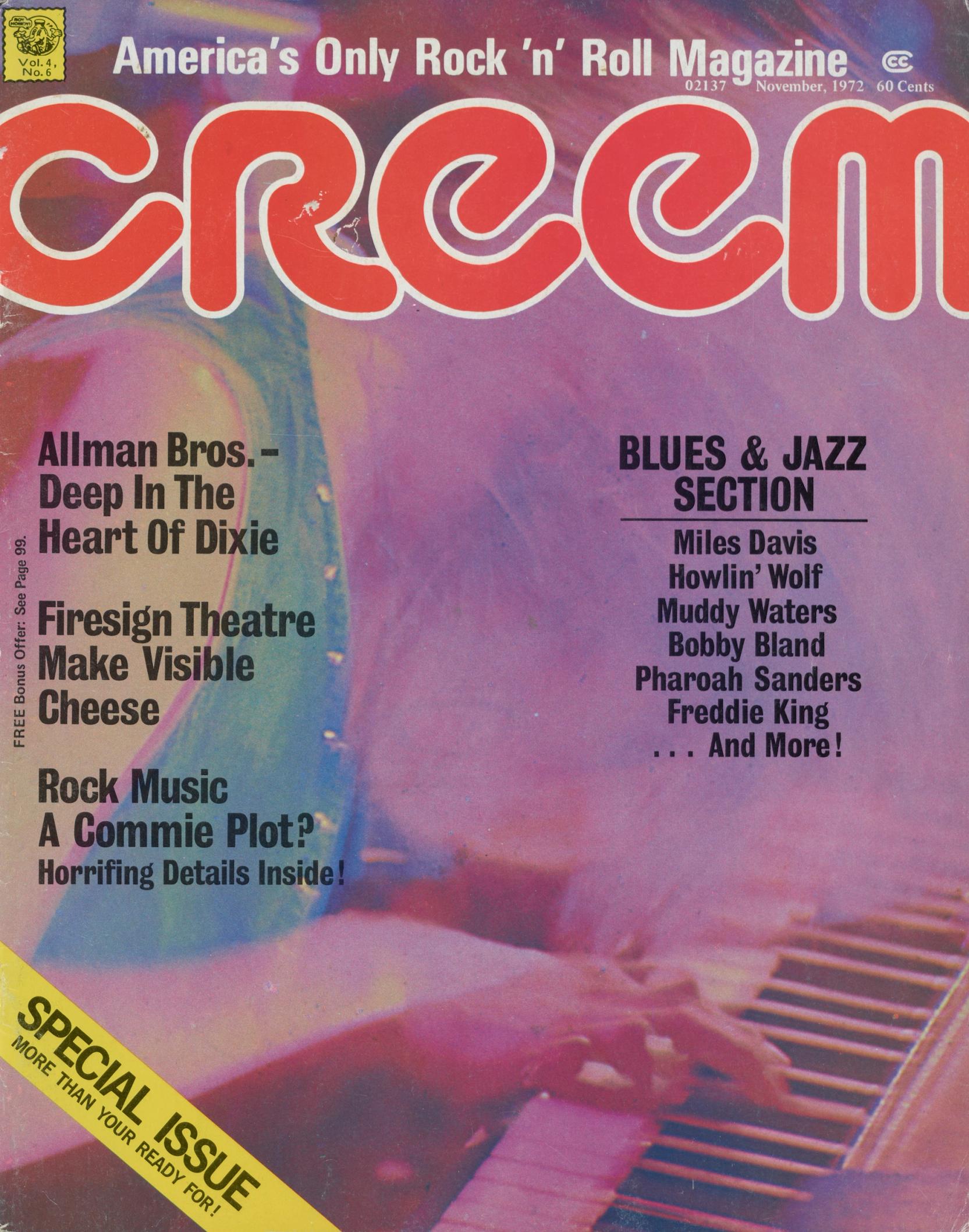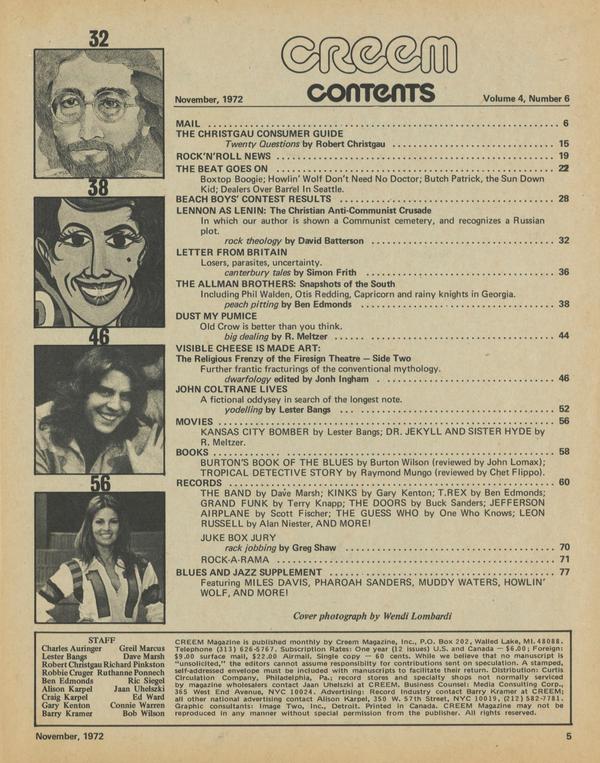
CREEM
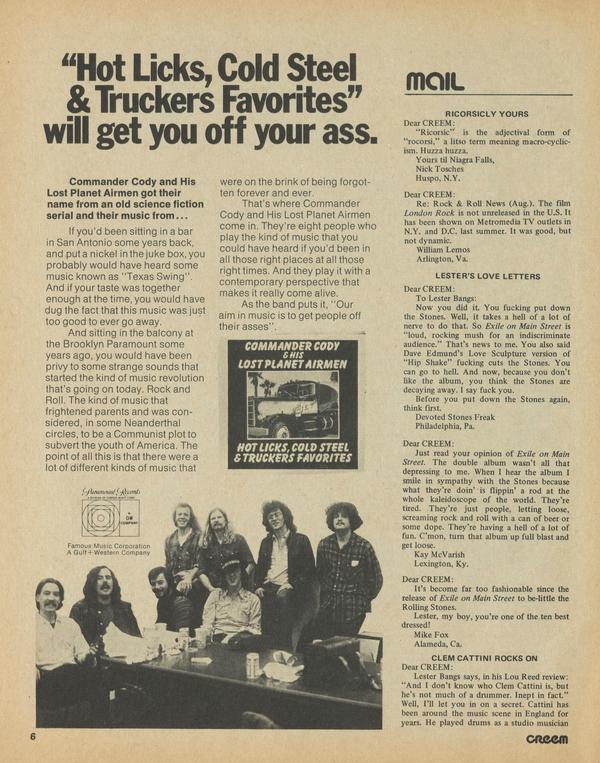
RICORSICLY YOURS Dear CREEM: “Ricorsic” is the adjectival form of “rocorsi,” a litso term meaning macro-cyclicism. Huzza huzza. Yours til Niagra Falls, Nick Tosches Huspo, N.Y. Dear CREEM: Re: Rock & Roll News (Aug.). The film London Rock is not unreleased in the U.S.
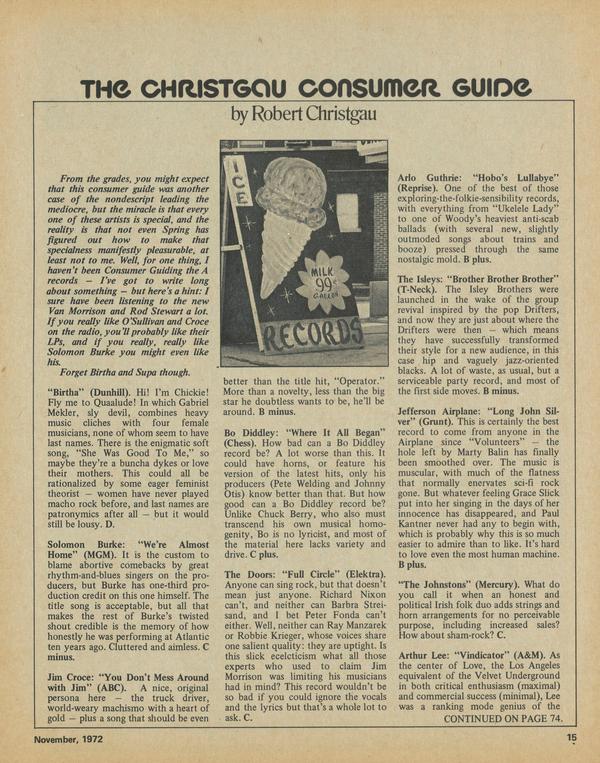
THE CHRISTGAU CONSUMER GUIDE
Robert Christgau
“Birtha” (Dunhill). Hi! I’m Chickie! Fly me to Quaalude! In which Gabriel Mekler, sly devil, combines heavy music cliches with four female musicians, none of whom seem to have last names. There is the enigmatic soft song, “She Was Good To Me,” so maybe they’re a buncha dykes or love their mothers. This could all be rationalized by some eager feminist theorist — women have never played macho rock before, and last names are patronymics after all — but it would still be lousy. D.
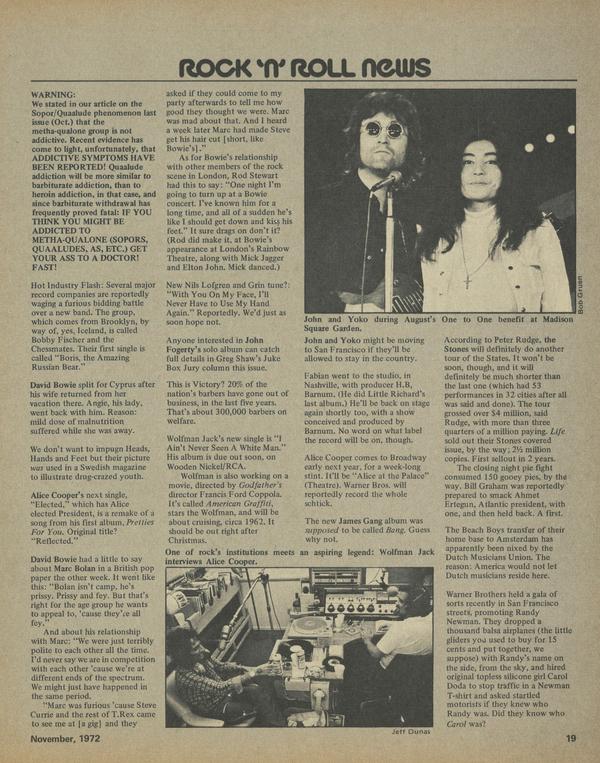
ROCK 'N' ROLL news
Hot Industry Flash: Several major record companies are reportedly waging a furious bidding battle over a new band. The group, which comes from Brooklyn, by way of, yes, Iceland, is called Bobby Fischer and the Chessmates. Their first single is called "Boris, the Amazing Russian Bear."
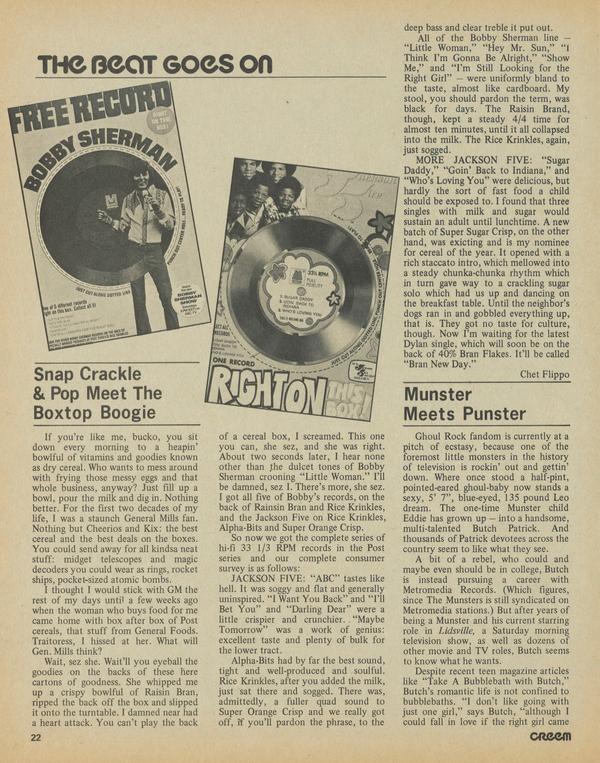
THE BEAT GOGS ON
Chet Flippo
If you’re like me, bucko, you sit down every morning to a heapin’ bowlful of vitamins and goodies known as dry cereal. Who wants to mess around with frying those messy eggs and that whole business, anyway? Just fill up a bowl, pour the milk and dig in.
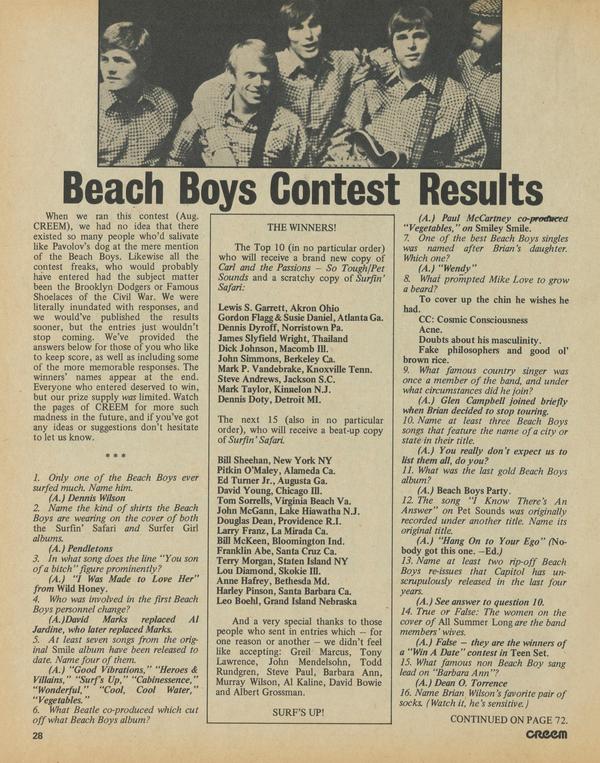
Beach Boys Contest Results
When we ran this contest (Aug. CREEM), we had no idea that there existed so many people who'd salivate like Pavolov’s dog at the mere mention of the Beach Boys. Likewise all the contest freaks, who would probably have entered had the subject matter been the Brooklyn Dodgers or Famous Shoelaces of the Civil War.
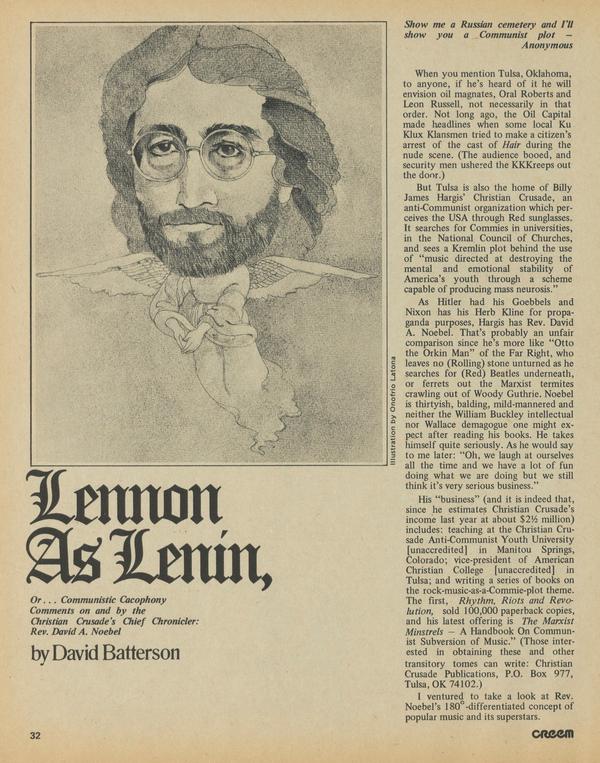
Lennon As Lenin
David Batterson
Or... Communistic Cacophony Comments on and by the Christian Crusade's Chief Chronicler: Rev. David A. Noebel
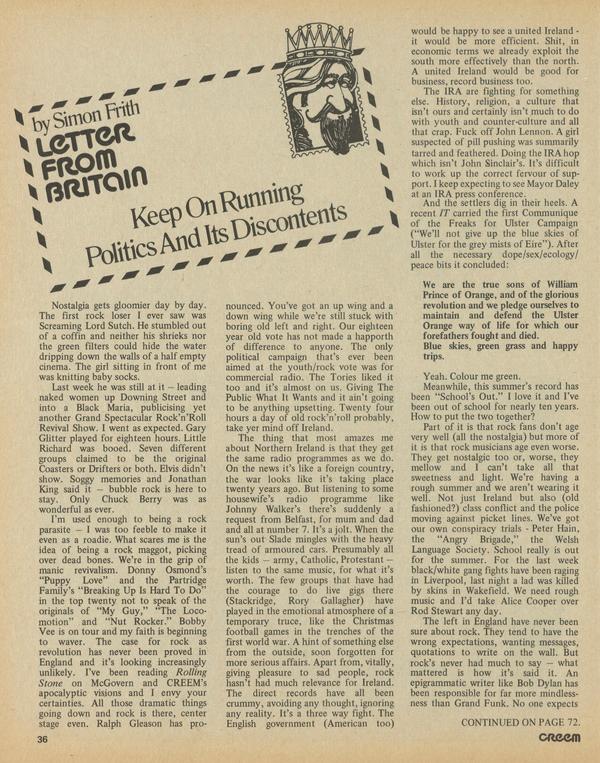
Letter From Britain
Keep On Runnmg Politics And Its Discontents
Simon Frith
Nostalgia gets gloomier day by day.
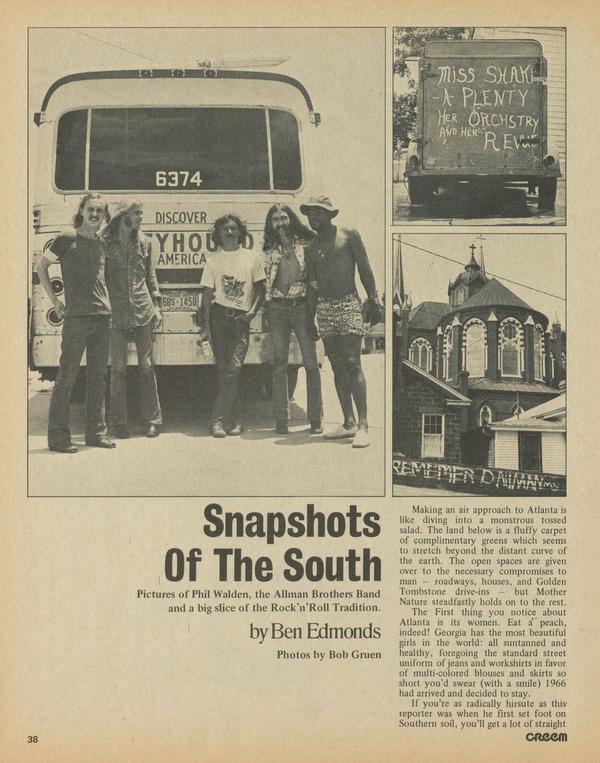
Features
Snapshots Of The South
Ben Edmonds
Pictures of Phil Walden, the Allman Brothers Band and a big slice of the Rock’n’Roll Tradition.
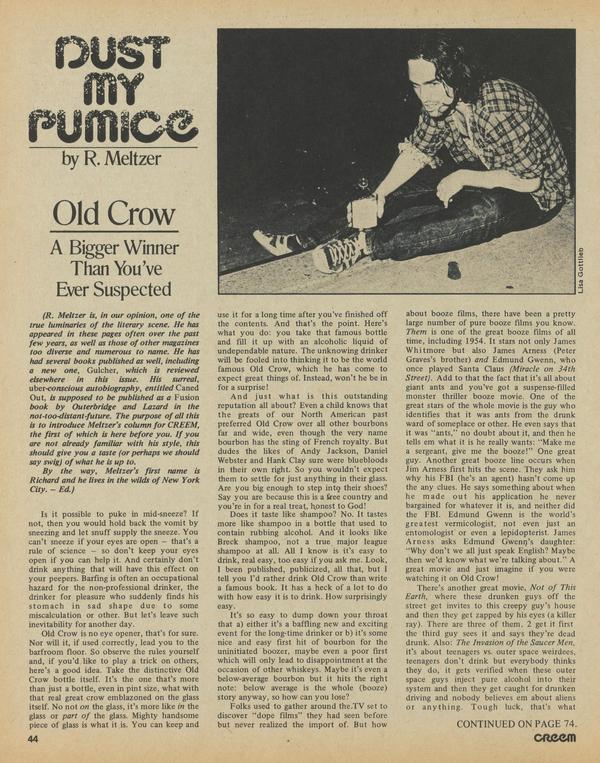
DUST MY PUMICE
R. Meltzer
Is it possible to puke in mid-sneeze?
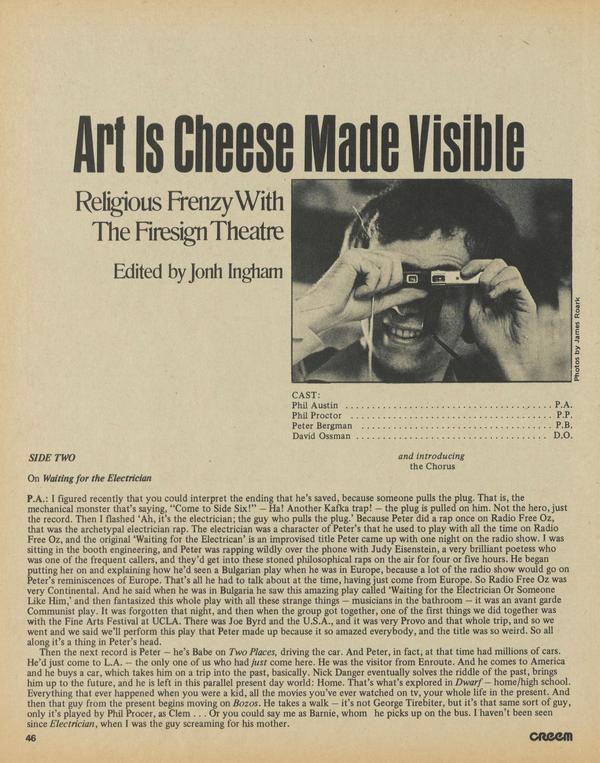
Art Is Cheese Made Visible
Jonh Ingham
SIDE TWO On Waiting for the Electrician P.A.: I figured recently that you could interpret the ending that he’s saved, because someone pulls the plug. That is, the mechanical monster that’s saying, “Come to Side Six!” — Ha! Another Kafka trap! — the plug is pulled on him.
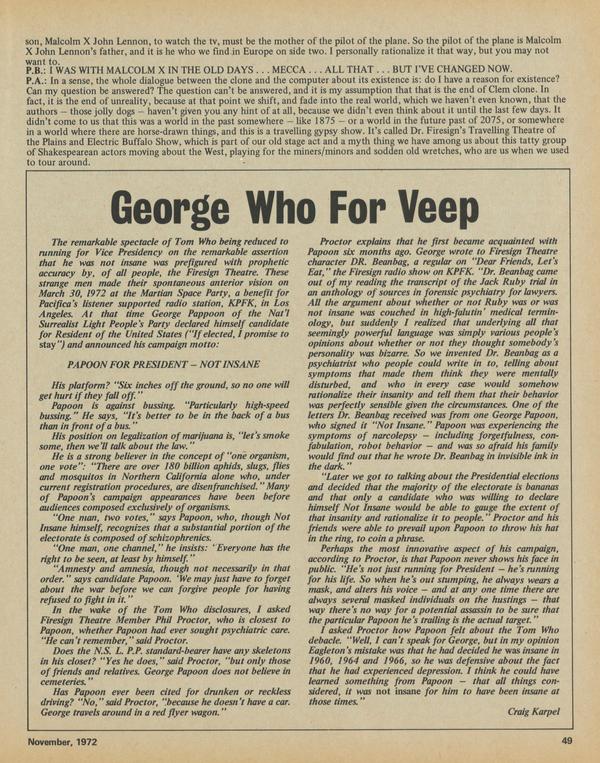
George Who For Veep
Craig Karpel
The remarkable spectacle of Tom Who being reduced to running for Vice Presidency on the remarkable assertion that he was not insane was prefigured with prophetic accuracy by, of all people, the Firesign Theatre. These strange men made their spontaneous anterior vision on March 30, 1972 at the Martian Space Party, a benefit for Pacifica's listener supported radio station, KPFK, in Los Angeles.
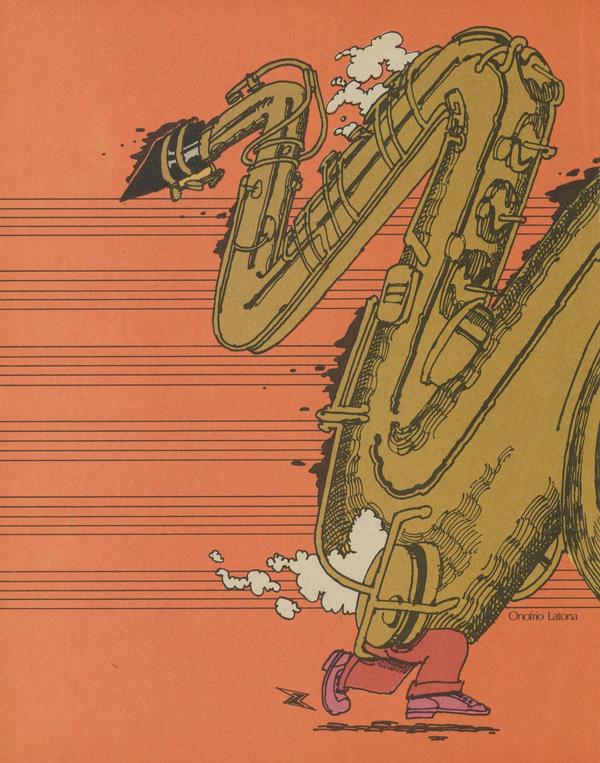
Features
JOHN COLTRANE LIVES
Lester Bangs
The whole thing started so simply. I never meant for it to end up in this bog of complications.
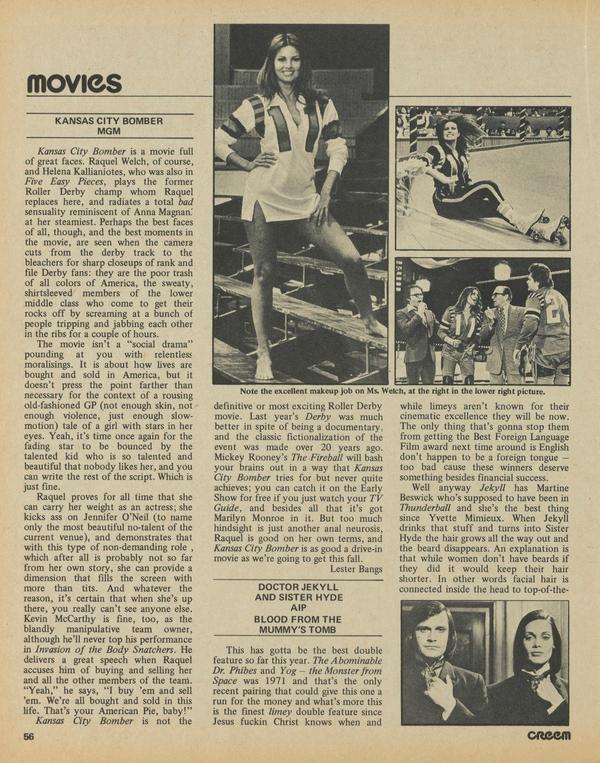
Creemedia
movies
Kansas City Bomber is a movie full of great faces.
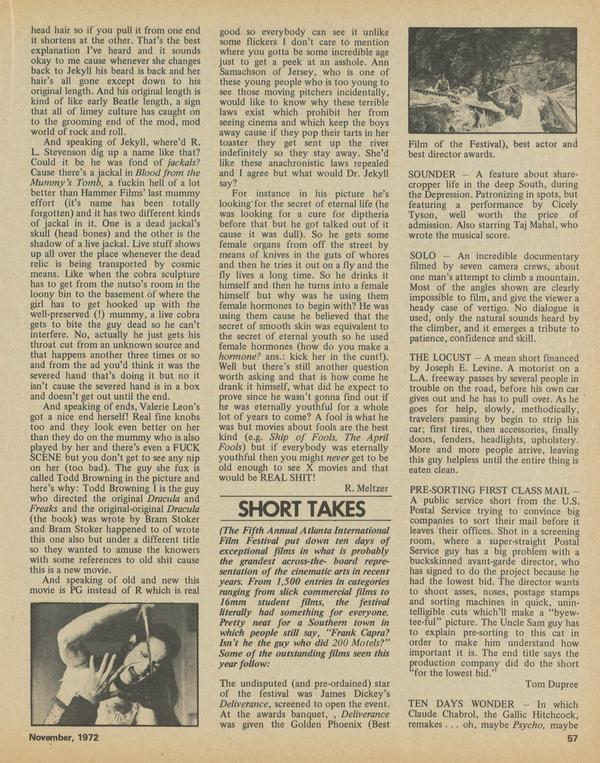
SHORT TAKES
Tom Dupree
The undisputed (and pre-ordained) star of the festival was James Dickey’s Deliverance, screened to open the event. At the awards banquet, , Deliverance was given the Golden Phoenix (Best Film of the Festival), best actor and best director awards.
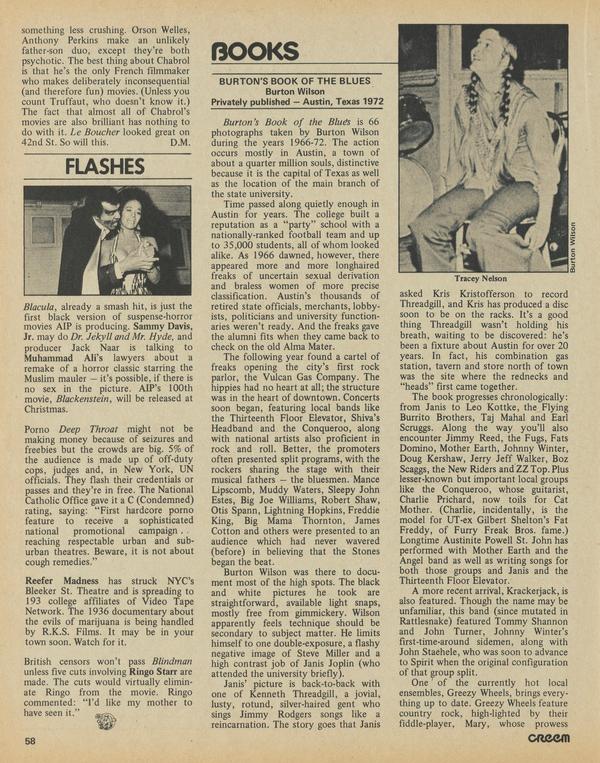
FLASHES
Blacula, already a smash hit, is just the first black version of suspense-horror movies AIP is producing. Sammy Davis, Jr. may do Dr. Jekyll and Mr. Hyde, and producer Jack Naar is talking to Muhammad AH’s lawyers about a remake of a horror classic starring the Muslim mauler — it’s possible, if there is no sex in the picture.

BOOKS
John Lomax
Burton’s Book of the Blues is 66 photographs taken by Burton Wilson during the years 1966-72. The action occurs mostly in Austin, a town of about a quarter million souls, distinctive because it is the capital of Texas as well as the location of the main branch of the state university.
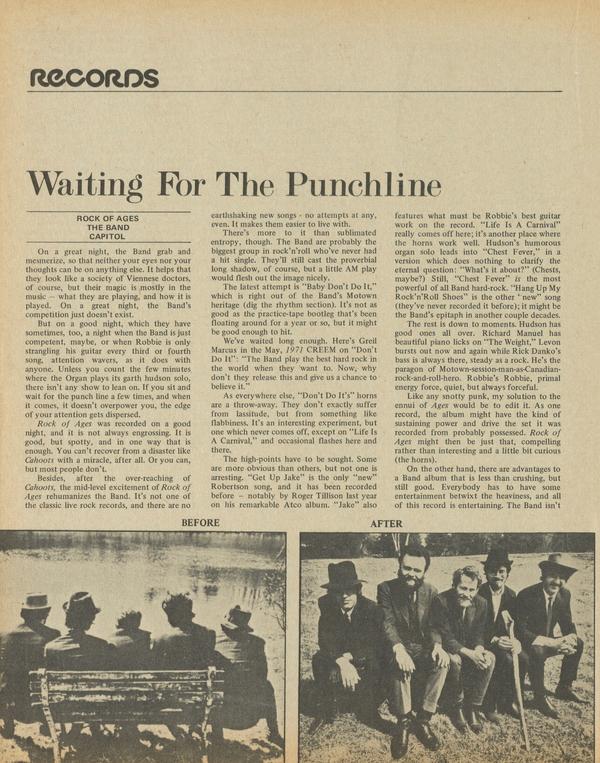
Waiting For The Punchline
Dave Marsh
On a great night, the Band grab and mesmerize, so that neither your eyes nor your thoughts can be on anything else. It helps that they look like a society of Viennese doctors, of course, but their magic is mostly in the music — what they are playing, and how it is played.
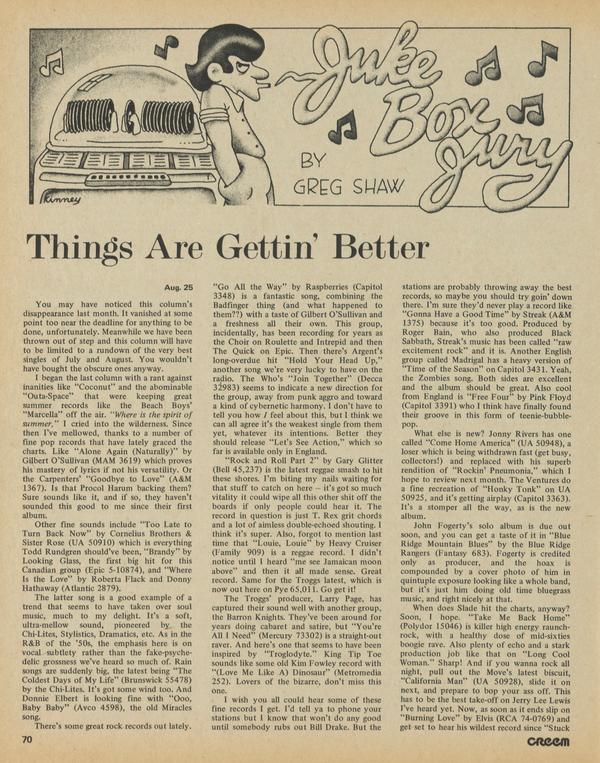
Things Are Gettin' Better
GREG SHAW
Aug. 25 You may have noticed this column’s disappearance last month. It vanished at some point too near the deadline for anything to be done, unfortunately. Meanwhile we have been thrown out of step and this column will have to be limited to a rundown of the very best singles of July and August.
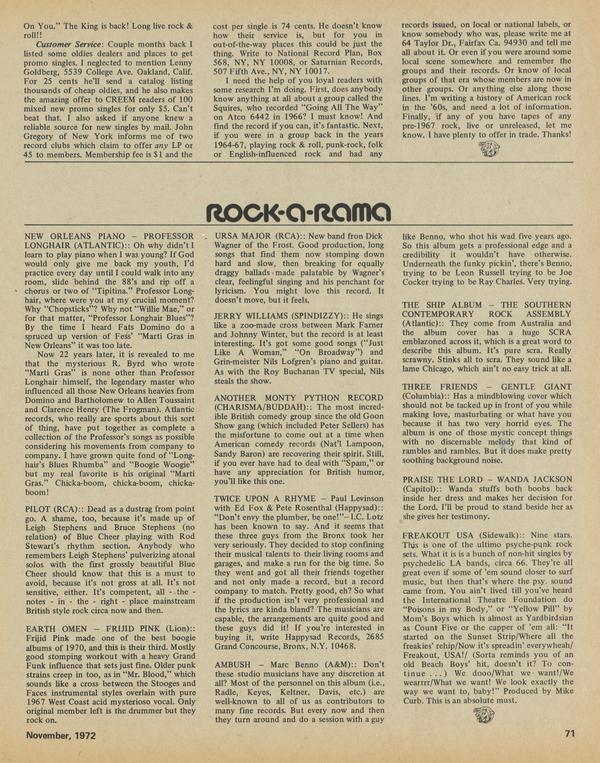
ROCK-A-RAMA
NEW ORLEANS PIANO — PROFESSOR LONGHAIR (ATLANTIC):: Oh why didn’t I learn to play piano when I was young? If God would only give me back my youth, I’d practice every day until I could walk into any room, slide behind the 88’s and rip off a chorus or two of “Tipitina.”
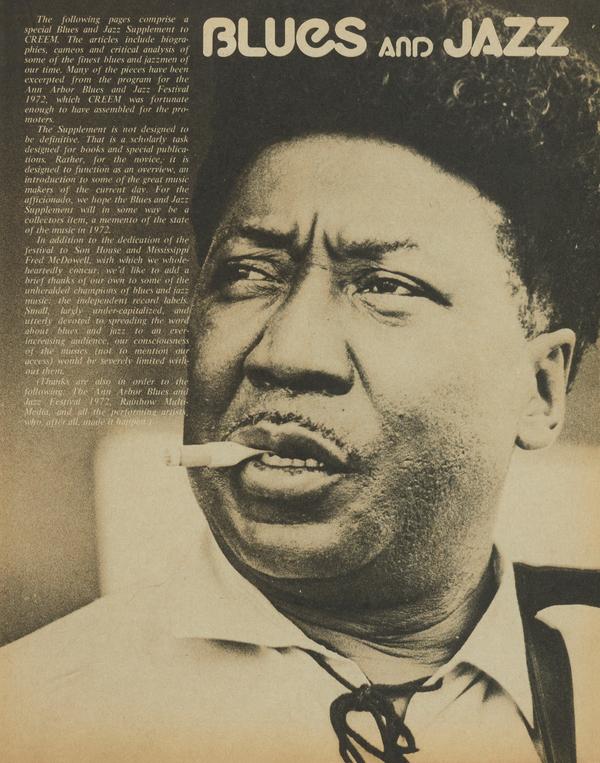
BLUES AND JAZZ
Tony Glover
The following pages comprise a special Blues and Jazz Supplement to CREEM. The articles include biographies, cameos and critical analysis of some of the finest blues and jazzmen of our time. Many of the pieces have been excerpted from the program for the Ann Arbor Blues and Jazz Festival 1972, which CREEM was fortunate enough to have assembled for the promoters.
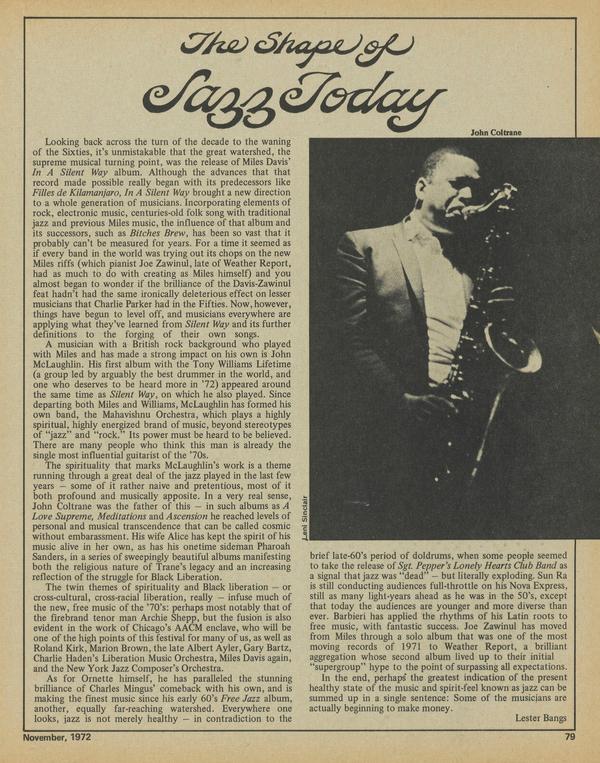
The Shape of Jazz Today
Lester Bangs
Looking back across the turn of the decade to the waning of the Sixties, it’s unmistakable that the great watershed, the supreme musical turning point, was the release of Miles Davis’ In A Silent Way album.
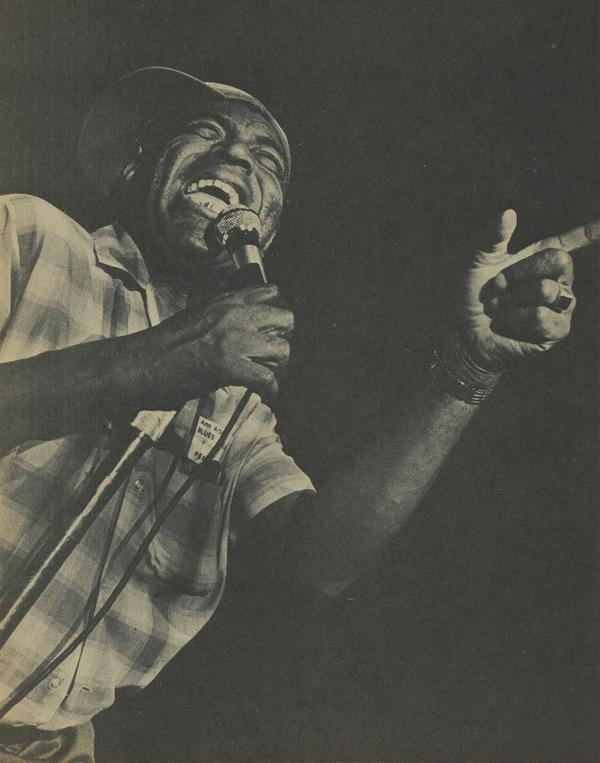
HOWLIN' WOLF
Ben Edmonds
Chester Arthur Burnett was born in West Point, Mississippi, on June 10, 1910. His early years were spent on the Young and Mara cotton plantation, where both his parents were employed, and he quite naturally fell into a farmwork vocation. It was a vocation which maintained supremacy until the man was 38, at which time a decidedly different vocation took the wheel.
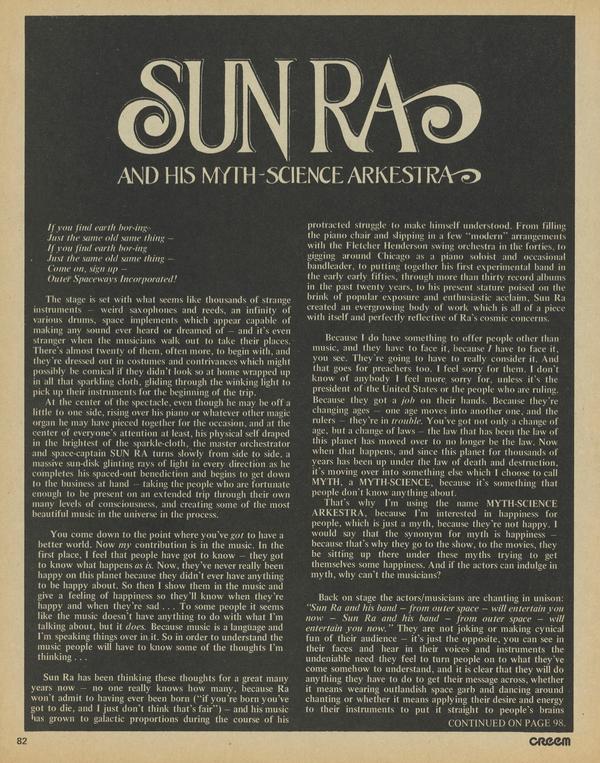
SUN RA
John Sinclair
The stage is set with what seems like thousands of strange instruments — weird saxophones and reeds, an infinity of various drums, space implements which appear capable of making any sound ever heard or dreamed of — and it’s even stranger when the musicians walk out to take their places.
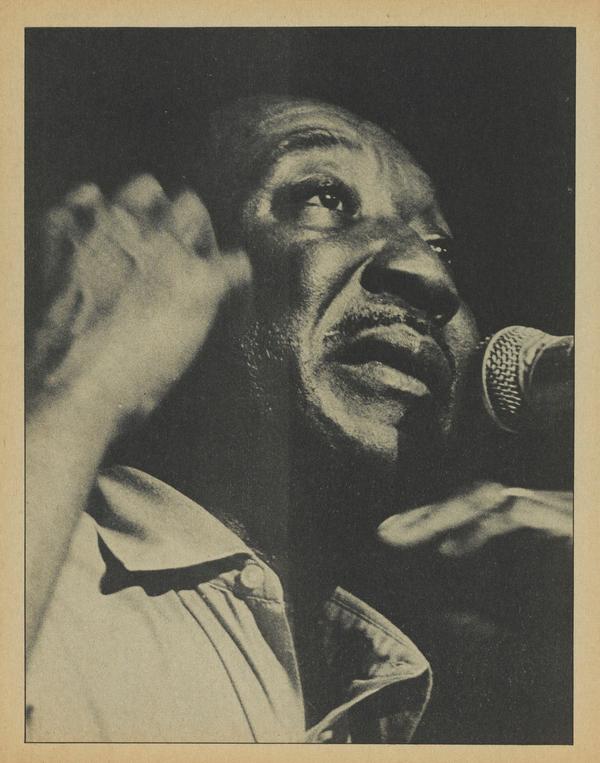
MUDDY WATERS
Tony Glover
Muddy Waters is not just a Chicago bluesman, he is the Chicago Bluesman — he gave the music its shape and style, and th city he worked in gave it the name. Muddy was born McKinley Morganfield in Rolling Fork Mississippi on April 4, 1915. That was in the heart of delta country, and delta country was blues country — Muddy heard and saw both Son House and Robert Johnson (two of the finest around) playing nearby.
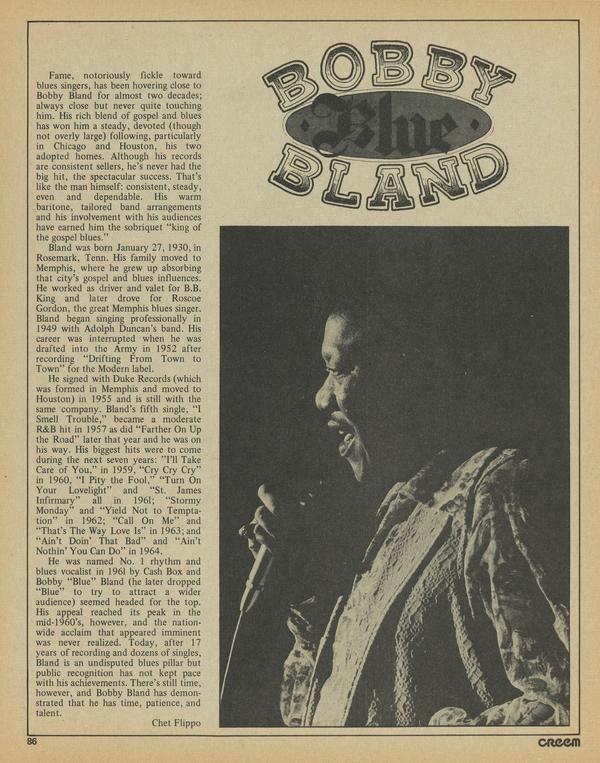
BOBBY Blue BLAND
Chet Flippo
Fame, notoriously fickle toward blues singers, has been hovering close to Bobby Bland for almost two decades; always close but never quite touching him. His rich blend of gospel and blues has won him a steady, devoted (though not overly large) following, particularly in Chicago and Houston, his two adopted homes.
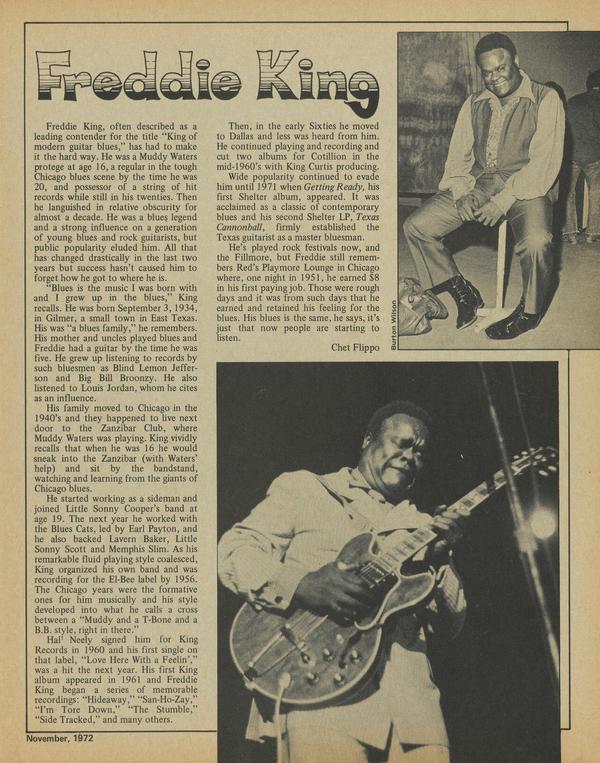
Freddie King
Chet Flippo
Freddie King, often described as a leading contender for the title “King of modern guitar blues,” has had to make it the hard way. He was a Muddy Waters protege at age 16, a regular in the tough Chicago blues scene by the time he was 20, and possessor of a string of hit records while still in his twenties.
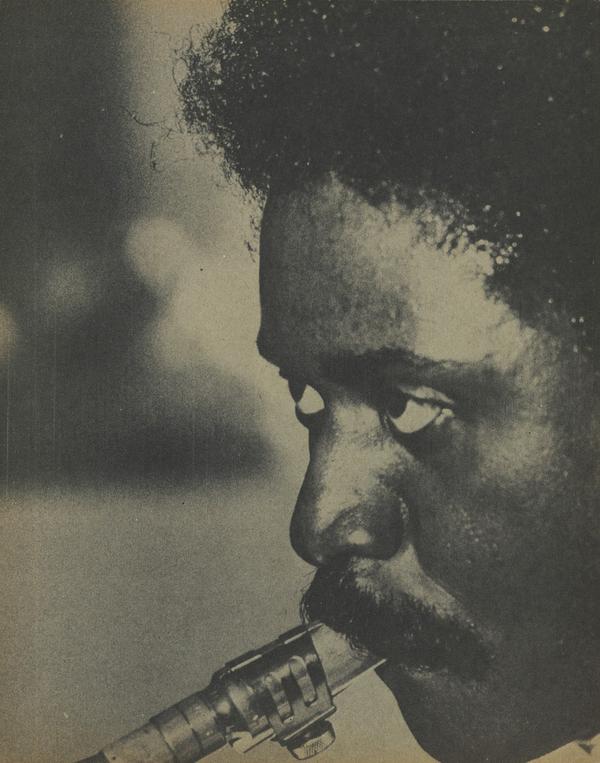
PHAROAH SANDERS
Lester Bangs
Pharoah Sanders was talking about a familiar component of Hindu religion and a personal element of his spiritual life, but he could just as easily have been talking about his music. In a time when musicians in both rock and jazz are breaking their necks trying to see who can be more cosmic, Pharoah Sanders stands as one of the few artists of our day to whom that beleagured word applies in its most profound sense.
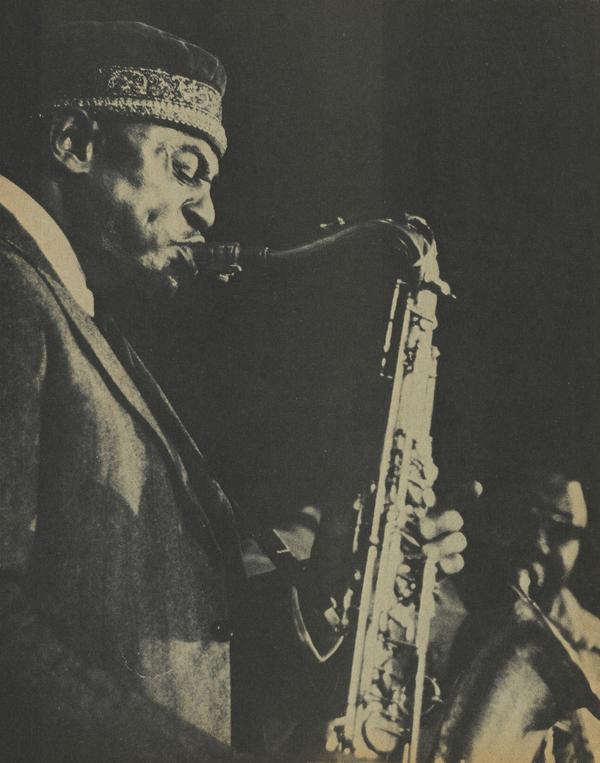
AROHIE SHEPP
Nick Tosches
Archie Shepp was born in Ft. Lauderdale, Florida, in 1937. He grew up in the Philadelphia ghetto and later attended Goddard College in Vermont, where he majored in drama. Always a prolific musician, Shepp began playing tenor sax full-time while at Goddard, which eventually led him into the New York jazz scene, where he met pianist Cecil Taylor.
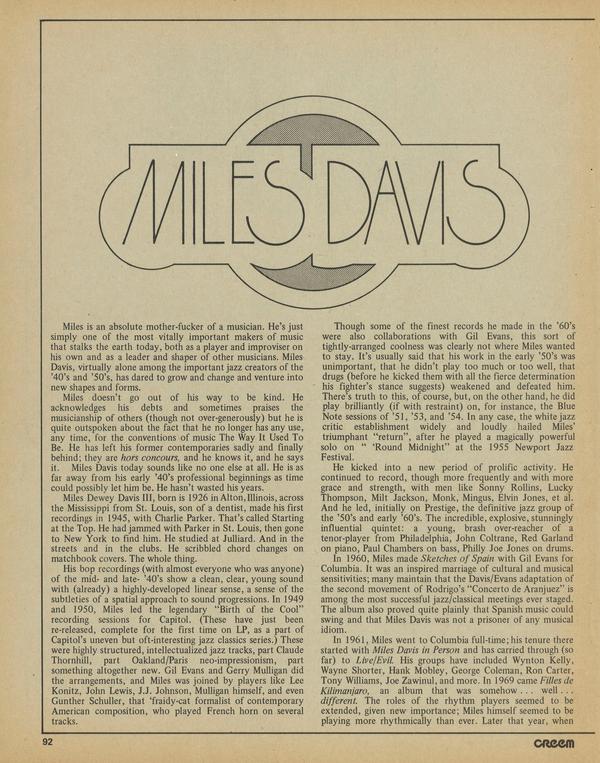
MILES DAVIS
Colman Andrews
Miles is an absolute mother-fucker of a musician. He’s just simply one of the most vitally important makers of music that stalks the earth today, both as a player and improviser on his own and as a leader and shaper of other musicians. Miles Davis, virtually alone among the important jazz creators of the ’40’s and ’50’s, has dared to grow and change and venture into new shapes and forms.
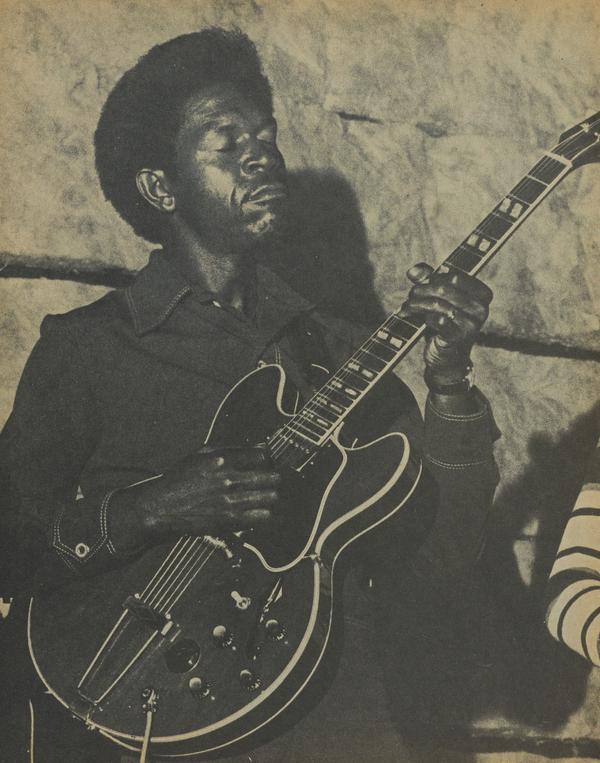
LUTHER ALLISON
Dave Marsh
“Luther Allison come into the picture about the middle of 1957. I needed a bass player and I met Luther Allison walkin’ on Ogden Avenue there strummin’ his big body type guitar, you know, and I asked him was he interested in learning to play and said, ‘Yes.’
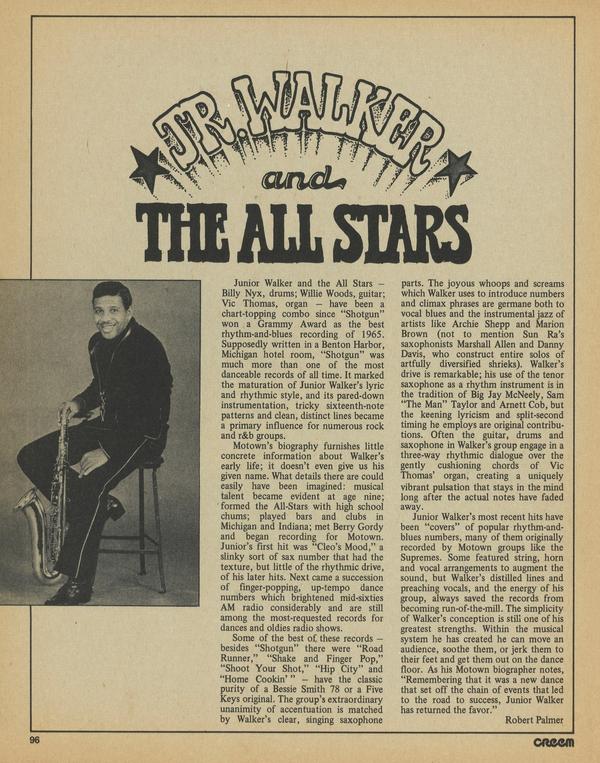
JR.WALKER and THE ALL STARS
Robert Palmer
Junior Walker and the All Stars — Billy Nyx, drums; Willie Woods, guitar; Vic Thomas, organ — have been a chart-topping combo since “Shotgun” won a Grammy Award as the best rhythm-and-blues recording of 1965. Supposedly written in a Benton Harbor, Michigan hotel room, “Shotgun” was much more than one of the most danceable records of all time.
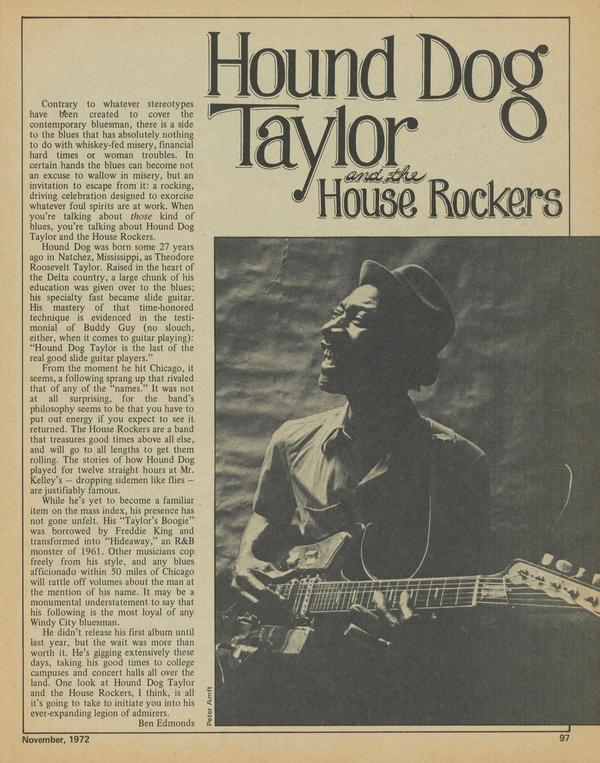
Hound Dog Taylor and the House Rockers
Ben Edmonds
Contrary to whatever stereotypes have token created to cover the contemporary bluesman, there is a side to the blues that has absolutely nothing to do with whiskey-fed misery, financial hard times or woman troubles. In certain hands the blues can become not an excuse to wallow in misery, but an invitation to escape from it: a rocking, driving celebration designed to exorcise whatever foul spirits are at work.

